According to the latest eLearning statistics, the digital education industry is expected to reach $243 billion by 2022, which means there’s no better time than now to jump on the bandwagon as a course creator.
If you are knee-deep in research, looking for the best online course platform for instructors, you’ve come to the right place.
This article compares two popular platforms, Kartra and Kajabi, to give you a better idea of which one has the features you need.
Kartra is an all-in-one tool for building your online business. It focuses on funnel building, product selling, and email marketing. While Kartra has direct all-in-one alternatives, for this comparison we’ll focused strictly on courses.
Kajabi is an online course creation platform designed to help you build and manage your knowledge business from one convenient place.
The two platforms have a lot of similarities, but also a few distinct differences, the main one being that Karta can be used for all types of products while Kajabi is mostly for courses and membership communities.
My team and I have spent 12 hours researching, reviewing, and rating these two platforms to give you a good idea of what each one offers.
Continue reading this Kartra vs. Kajabi comparison to learn everything you need to know about their similarities and differences so you can make the best choice to suit your needs.
1. Course Creation
As an instructor, course creation features are extremely important to the success of your online business, so that’s what we’re going to look at first in this Kartra vs. Kajabi comparison.
Kartra:

Kartra allows you to create membership websites, membership portals, and access levels. It comes with a drag-and-drop membership builder that is extremely easy to use, allowing even total beginners to create beautiful, custom-branded courses and membership portals in minutes.
There are predesigned course templates so you never have to design your course pages and websites from scratch. The templates are mobile-optimized and aligned with industry best practices for building effective courses.
Kartra also has multiple membership tiers and gives you the ability to upload files and videos and embed videos and other media so you can deliver full courses.
You can drip content to your students and run automation to make it simpler to manage your content and run your knowledge business.
Here’s a quick summary of the platform’s main features:
- Drag-and-drop membership builder
- Custom branded member sites
- User access levels
- Upload/embed videos and files
- Drip content
This video shows how to Create a Course on Kartra:
Kajabi:
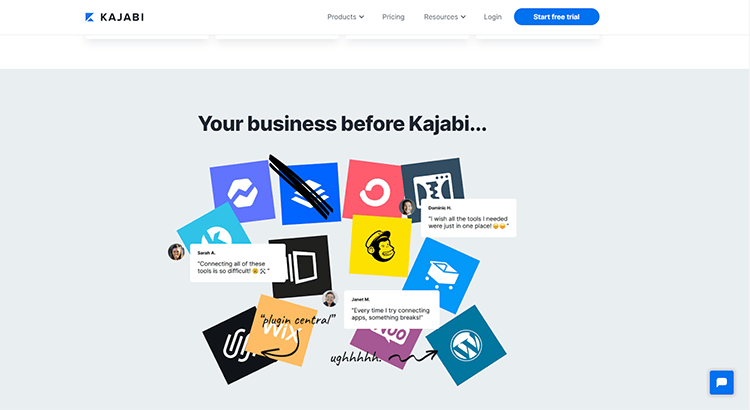
Unlike Kartra, Kajabi only focuses on course creation. However, this type of specialization also means that this platform has more powerful features for creating online courses and membership websites.
For example, in addition to the regular features that you expect from an online course platform in this category (e.g. drag-and-drop builder, pre-designed course templates, uploading various types of media, and so on), Kajabi also offers unique automation features, such as lecture-specific automation.
If a student finishes a lesson or post, you can add a tag, send them an email, register for an upcoming event, etc.
This is a powerful form of automation that you won’t find on Kartra.
Kajabi also lets you create your own community, and you have the ability to make use of features such as:
- Custom domain
- Private conversations
- Unlimited views
- Embed in memberships
- Real-time notifications
- Email notifications
This video shows how to Create a Course on Kajabi:
Winner: Kajabi
With regards to course creation, Kajabi wins because it has a lot more to offer than Kartra. The community features, in particular, make Kajabi the better option for edupreneurs who want to build a community around their product.
Kajabi also excels thanks to its lecture-level automation features that allow you to trigger emails to students the moment they complete a specific part of your course.
2. Pricing
Pricing is yet another important consideration before you choose the best online course platform.
Here’s a closer look at how these two platforms compare:
Kartra:
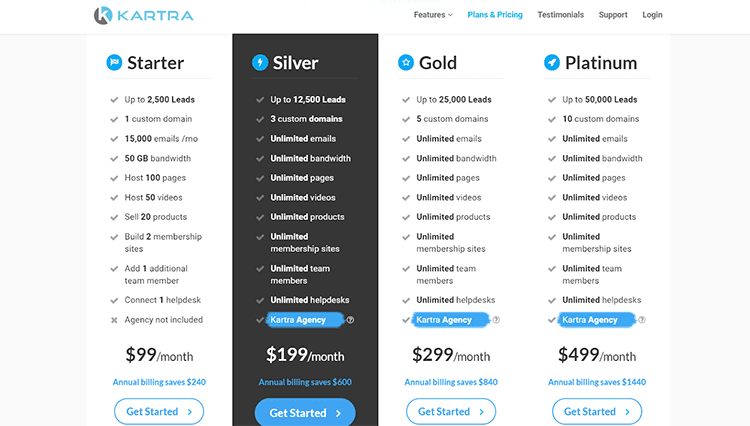
Kartra has four simple pricing plans. You can pick a plan, pay monthly or yearly, switch plans, or cancel at any time.
When you pay annually, you save up to 25% per month.
Plans are as follows:
- Starter Plan ($99/month): This plan comes with a custom domain, 50 GB bandwidth, and the ability to build 2 membership websites. With this plan, you can have up to 2,500 leads and send 15,000 emails per month. You can host 100 pages, 50 videos, and sell 20 products. Add one additional team member and connect one help desk.
- Silver Plan ($199/month): This plan comes with up to 12,500 leads, 3 custom domains, and unlimited emails, bandwidth, pages, videos, and products. You can also build as many membership websites as you require and have unlimited team members and help desks. The Silver plan also has Kartra Agency, a feature that allows you to access your entire agency portfolio to easily manage all client accounts from one centralized master console.
- Gold Plan ($299/month): The Gold plan has everything in the Silver plan, as well as up to 25,000 leads and 5 custom domains. When you opt for annual billing on the Gold subscription, you save an impressive $840 in fees each year.
- Platinum Plan ($499/month): This plan allows up to 50,000 leads and 10 custom domains. You also have access to all the other features in the Silver and Gold plans with no limits whatsoever. When you pay yearly, you can save up to $1,440 every year.
Right now, Kartra has a limited-time offer to try the platform’s full features for a $1 trial.
Kajabi:
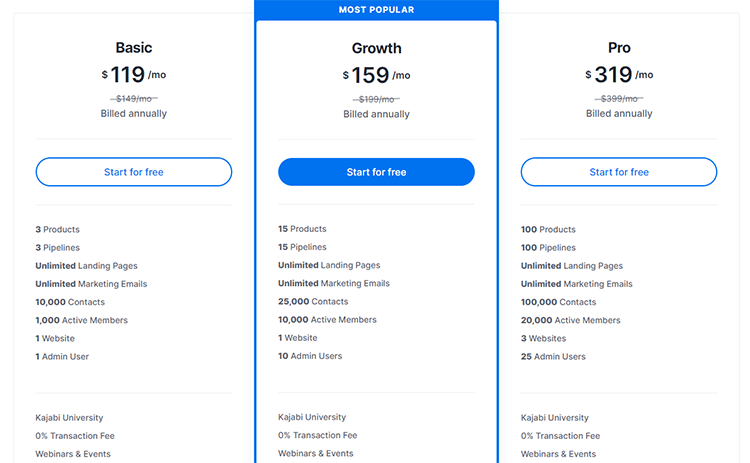
Kajabi offers a 14-day free trial for each of its three plans. When you opt for an annual subscription, you can save up to 20% each month.
Plans are as follows:
- Basic Plan ($119/month): This plan allows you to have 3 products and 3 pipelines. It comes with unlimited landing pages and marketing emails. You can have up to 10,000 contacts and 1,000 active members. You get one website, ready-to-use templates, webinars, and events, and one admin user, as well as chat support and automation.
- Growth Plan ($159/month): This plan has everything on the basic plan, as well as 15 products and 15 pipelines. It also has unlimited landing pages, marketing emails, and one website. You get up to 25,000 contacts and 10,000 active members, and you can add up to 10 admin users. Furthermore, the Growth plan gives you access to the affiliate program and advanced automation. You’ll also be able to remove the “Kajabi” branding from your pages.
- Pro Plan ($319/month): On this plan, you have full access to all the platform’s features. You can have up to 100 products and pipelines, 100,000 contacts, and 20,000 active members. You also get 3 websites, 25 admin users, and an advanced code editor for skilled web developers who want to create a truly unique online course website.
Winner: Kartra
Both platforms offer a lot of similar features, but Kartra’s pricing structure is more growth-focused which makes it ideal for beginners who want an affordable plan they can grow with.
Another great thing about Kartra is that it doesn’t hold back on any of the important features for the higher-priced plans (e.g. affiliate marketing, advanced automation, etc.) in the same way Kajabi does.
3. School and Course Marketing
The next feature that we’ll be looking at in this Kartra vs. Kajabi comparison is school and course marketing.
The platform you choose needs to have robust marketing features, otherwise, you’ll have a hard time getting your course in front of the eyes of your target students.
Fortunately, both Kajabi and Kartra have a lot to offer in this regard.
Kartra:
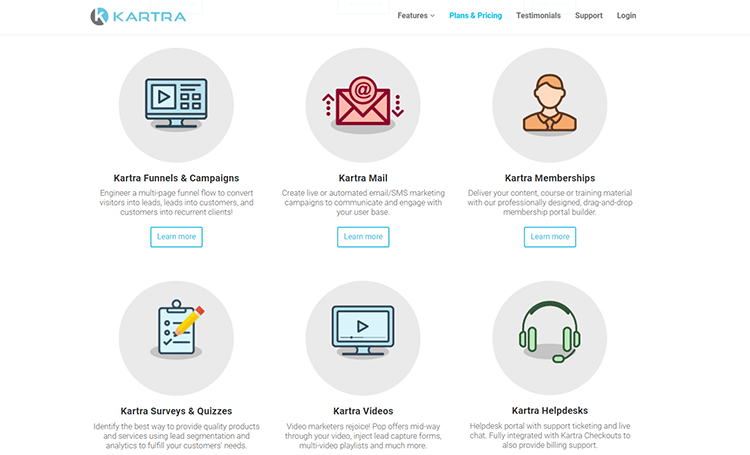
Kartra’s strengths lie in the marketing and funnel-building side of things. The platform also has exceptional email marketing and automation features, which makes it a great option for anyone seeking an all-in-one platform that will take care of all their marketing needs.
In fact, you can even automate entire email marketing workflows on this platform. There are a ton of other built-in tools and third-party integrations to make managing your online business easier, such as helpdesk, booking calendars, dynamic OTOs, behavioral advanced marketing, and various other advanced marketing features.
Kartra also has a prebuilt Campaign Marketplace that takes a lot of the hard work out of creating successful marketing campaigns.
Here’s a quick summary of Kartra’s marketing features:
- Send broadcast emails, automatic responses, etc.
- Split test emails to find the best performing versions
- Beautiful email templates for professional-looking marketing communications
- Handy and intuitive sales pipeline builder for high-converting funnels
- Pre-built campaign marketplace and done-for-you campaigns
Kajabi:
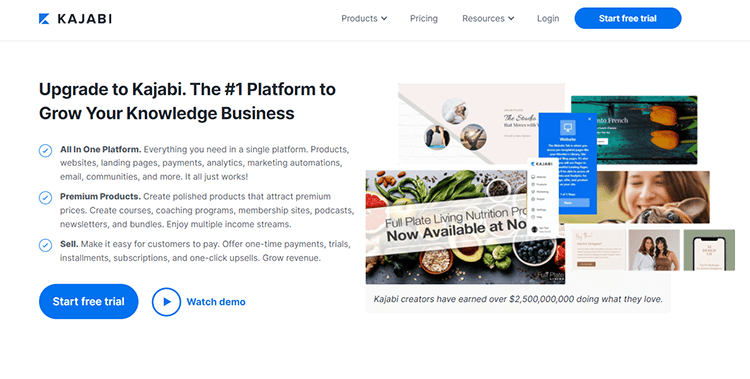
Unlike Kartra, Kajabi focuses mainly on building courses and creating membership portals. The platform does have great features for email marketing and automation, as well as advanced marketing features, but it’s preferred by many for its solid learning management system as opposed to its funnel-building capabilities.
When compared to Kartra, the marketing features of Kajabi are a bit limited. For example, you get limited video playlist functionality, limited video call to action, and no ability to unlock videos, whereas all these features are available on Kartra.
Here’s a quick summary of Kajabi’s marketing features:
- Build and manage your email list
- Segment your audience and use the tagging feature to send relevant content
- Email marketing campaign templates
- Offer one-time payments, trials, subscriptions, and installments
- One-click upsells to grow your revenue
Winner: Tie
Kajabi and Kartra’s email features are somewhat similar, but Kartra has split testing functionality which gives it the edge over its competitor.
Also, Kartra has a powerful sequence builder, and it provides you with a centralized place where you can manage all your automation easily.
When it comes to sales funnels, however, Kajabi is the clear winner thanks to its ability to create high-converting sales pipelines. It has a visual editor designed to make the process a simple and intuitive one, whereas, on Kartra, building sales funnels is a lot more complicated.
4. Instructor Support
Depending on your level of skill in building, marketing, and selling online courses, you might need more or less help than the average user. This means you’ll prefer one platform over the other according to the level of support they provide to instructors.
Let’s take a quick look at how these two platforms stack up with regard to their customer support.
Kartra:
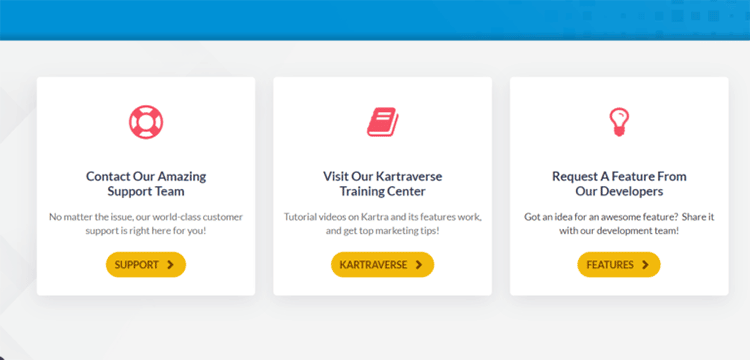
Kartra’s customer support is provided via online tickets or live chat. You have access to support agents Monday to Friday from 8 AM to 12 PM PST.
You can submit a ticket anytime and the helpful support team will get back to you with answers to your questions.
You also have access to “Kartraverse” online, the platform’s training program to help users get the most from their Kartra account.
Here you’ll find tons of tutorials and helpful guides on everything from course building strategies to helpful marketing tips, and much more.
In fact, there’s so much content here that it can prove difficult to navigate. Fortunately, the platform comes with a simple site map that explains where you can find the specific content you need.
Kajabi:
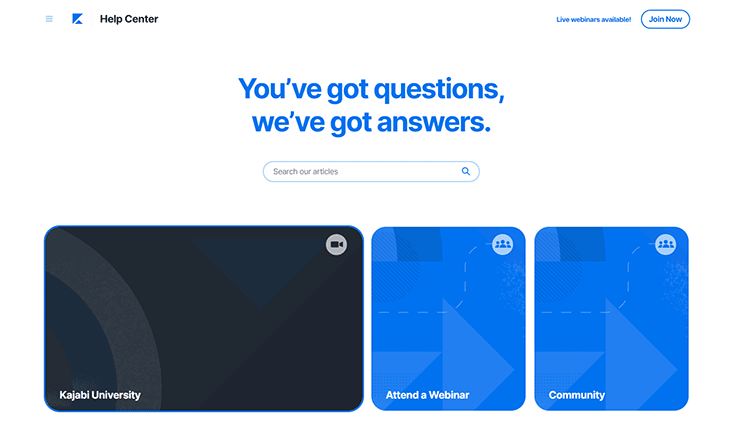
The type of customer support you get from Kajabi is dependent on the plan you’re on. For instance, if you are on the basic plan, you only have access to live chat support during specific hours.
But, on the “Growth” plan, you have 24/7 access to the support team via chat.
You can contact Kajabi through email regardless of the plan you’re on. You also get access to Kajabi University where you’ll find dozens of hours worth of training videos, tutorials, and resources designed to help you make the most of the platform’s course-building and marketing tools.
Furthermore, Kajabi has a vibrant community of users that you can network with. It’s a great place for you to find support from other like-minded individuals and possibly learn strategies for marketing and selling your online course using this software.
Winner: Tie
Depending on your needs, one platform’s support options will appeal to you better than the other, so we will call this one a tie.
You can make your choice depending on your particular support needs.
5. School and Course Customization
Customization is a crucial aspect of your course-building process. It will play a huge role in your level of success when marketing and selling your online course.
That’s why it’s important to choose a platform that offers full customization capabilities so you can create a beautiful, unique, and engaging experience for your students.
Kartra:
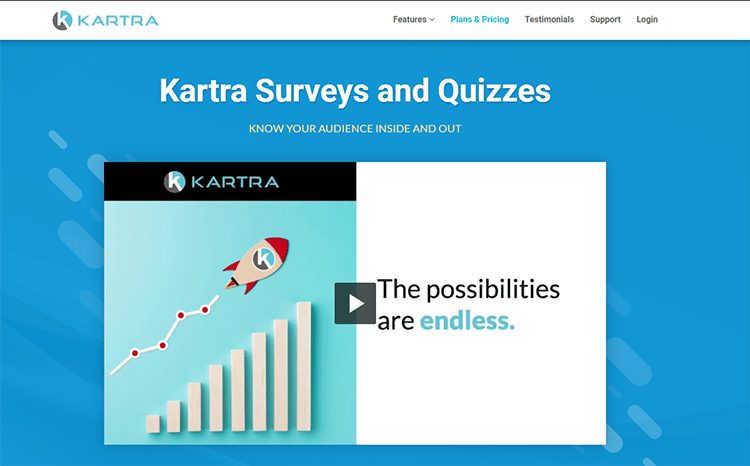
Kartra has a ton of features that allow you to create a unique learning experience. This includes things such as goal-based automation, campaign triggers, custom wait steps, and conditional filtering.
The platform’s powerful visual campaign builder also allows you to split test your pages so you can go with the version that performs best.
Instructors also get custom domains and pre-designed web page templates for different types of courses.
You have the ability to use custom HTML and the platform has a responsive design so you can be sure your course looks great on every device. There are a ton of other features and integrations to help you create a one-of-a-kind course.
These include:
- Built-in landing page creator
- Landing page customization
- Landing page templates marketplace
- Custom thank you pages
- Built-in web form creator
… and many other features.
Kajabi:
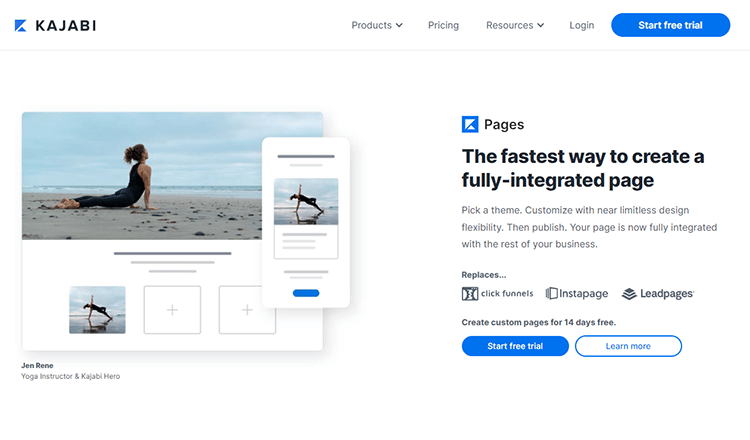
Kajabi has an equally powerful webpage builder and editor that will empower you to build your own course webpages and host your content.
Like its competitor, this platform has website templates that you can customize fully to align with your tastes.
There are six themes to choose from that will dictate your website’s overall appearance, but you also have the ability to import custom themes if that’s what you prefer.
Kajabi has an additional 20 expertly-designed page templates that allow you to customize your website’s sales funnel pages. Although the range isn’t huge, the temples are all modern, clean, and professional-looking.
Winner: Kajabi
If you consider design features alone, then Kartra has the upper hand in this regard. But, it’s important to note that the platform doesn’t have blogging functionality which means that you’d have to integrate a third-party app to run a blog on your course website.
If this feature is important to you, then you may consider using Kajabi instead.
Kajabi allows you to build and manage your own blog on your online course website. You can easily create posts and add videos and other content.
Also, Kajabi has an automatic post index that you can further customize to align with your needs.
6. Student Experience and Retention Tools
Your success as a creator comes down to your ability to engage students and help them learn and retain the information in your courses.
Many of the top online course building platforms come with built-in tools to help enhance your student experience and attention, including things such as:
- Course welcome and completion emails
- Custom course completion pages
- White-labeled URLs
- Mobile access features
- Language translation
- Custom student dashboard
… and many others.
Here’s a look at the student experience and retention features you get on Kartra and Kajabi.
Kartra:
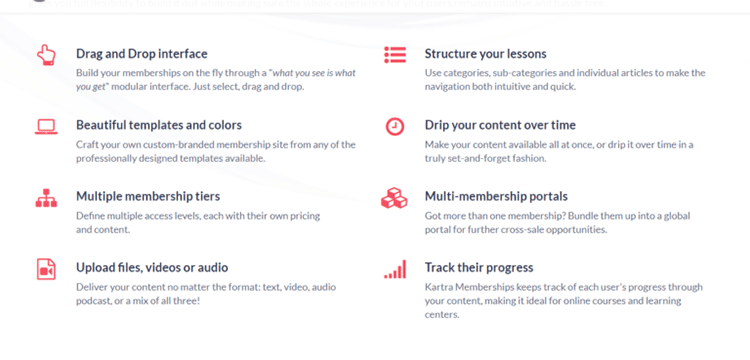
With regard to learning and engagement features, Kartra is a little more limited than Kajabi.
For example, the platform doesn’t allow you to create surveys or quizzes. This means that if you need to test your students’ retention levels with these tools, then you have to integrate third-party apps.
Kartra also lacks the functionality for creating community areas. However, the platform does allow you to drip feed or lock your course content.
Kajabi:
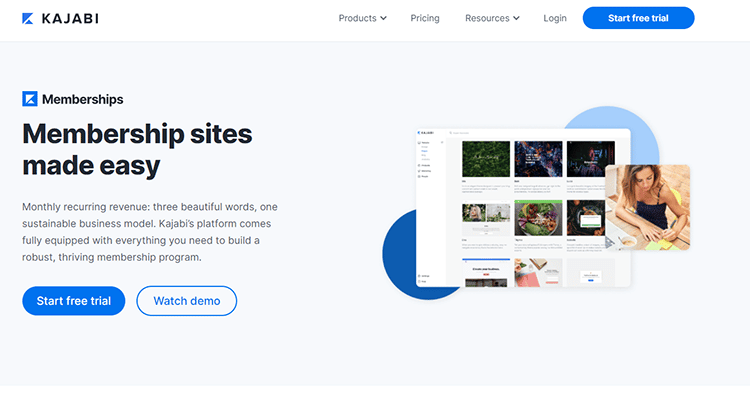
Kajabi has a wide range of learning and student engagement features to help you deliver an exceptional experience. The platform’s most notable features include:
- Assessments
- Quizzes
- Online community
- Drip feed
- Locked content, etc.
So, for example, if you want students to complete your course lessons in chronological order, and use assessments to review their attention and understanding, you can do that on Kajabi.
Winner: Kajabi
Since this platform specializes in course creation and building membership portals, it’s no surprise that it has exceptional student experience and retention features.
7. Data Analytics
In this part of the Kartra vs. Kajabi comparison, we’ll analyze their data analytics capabilities.
If you want to build a successful knowledge business, you need to collect and analyze a lot of data that will help you make better-informed business decisions.
Both Kartra and Kajabi offer robust data analytics features that will help you find opportunities for improvement and optimization when creating, promoting, and selling your online course.
Kartra:
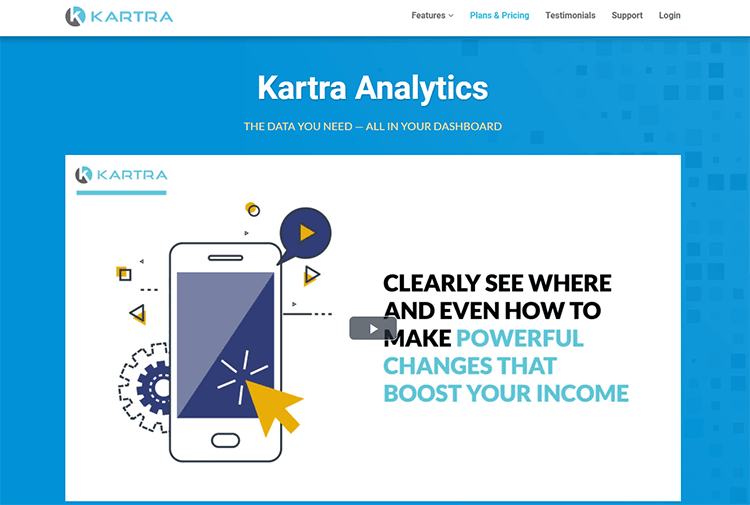
According to Kartra, companies that use data-driven marketing are up to six times more likely to be profitable than ones that don’t. That’s why the platform places a firm focus on detailed analytics.
Kartra has a powerful analytics tool that you can use to monitor the success of your email marketing campaigns. You can get a clear view of whether or not your forms are converting, which videos are being viewed, how many visitors your pages are getting, and much more.
The platform even gives you a complete lead history report that’s filled with all the interactions your leads have had with your online course or school since joining your list.
You get all of this information in real-time allowing you to make data-driven choices that ensure your business success.
Kajabi:
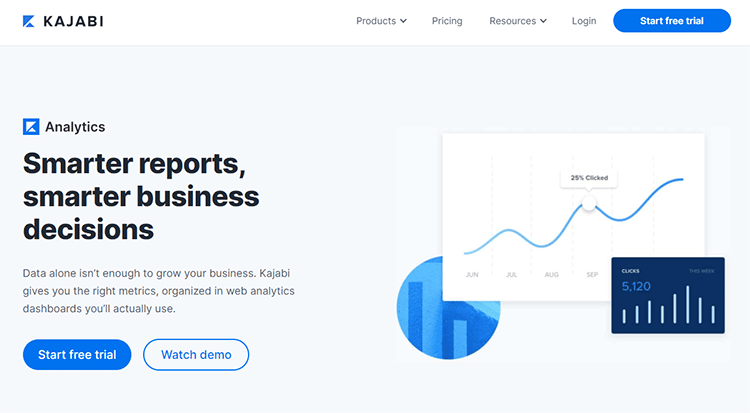
In terms of tracking and analysis, Kajabi doesn’t offer nearly as much as Kartra. For instance, you don’t get tracked links or split testing features.
However, you can get visual performance reporting, lifetime value reports, and custom date range reporting filters. You also get the following:
- Broadcast analytics
- Sequence analytics
- Detailed form analytics
- Page analytics
- Membership site analytics
… and much more.
In other words, the platform allows you to gather as much information as possible from your contacts so you can inform your future marketing strategies accordingly.
Winner: Kartra
It’s a close call because both Kajabi and Kartra offer robust data analytics features. However, Kartra wins this one because the platform has quite a few tracking and analytics features that you won’t find in Kajabi, such as split testing, tracked links, goal conversion rate/time reports, and analytics for affiliate sales.
8. Advanced Tools and Developer Features
Some online course platforms offer theme importers and SSL features while others have APIs designed for developers.
If you are a power user, then you’ll appreciate an online course platform that gives you access to the CSS/HTML editing environment so you can use your skills and knowledge to create a truly unique learning experience.
Let’s see what Kajabi and Kartra have to offer.
Kartra:
Most people love Kartra for its simplicity. And, if web development isn’t your forte, you’ll appreciate the visual page builder on the platform which allows you to drag-and-drop elements onto a page to create the look and layout you want.
However, for those who want to dive deeper and unleash their design creativity, the platform gives you full access to the code so you can get the most from the platform.
Also, Kartra allows you to request a feature, which means that rather than struggle to make the software easier to use, you can just forward your development ideas to the platform’s dev team so they can get it done for you.
Kajabi:
Like Kartra, Kajabi takes away the need for hiring expensive development teams by allowing you to use the drag-and-drop builder to create stunning pages. But, if you need access to the platform’s code, you have that option, as well.
Like Kartra, Kajabi offers a “Request a Feature” feature. The platform partnered with Pendo to provide users with the customer feedback portal that allows them to collect data collaboration from both users and the development team.
What’s nice about Kajabi’s version of “request a feature” is that you have access to the list of requests that are in the queue.
If the feature you want to request is already on the list, you can simply use the “upvote” function to move it up through the priority chain. The developers will work on the features with the most upvotes first.
Winner: Kajabi
Both platforms have great features for developers, but Kajabi wins this one because the software also has tracking after a request has been placed. This makes it easy for you to see whether or not your feature will soon become a reality.
9. Security
These days, security is one of the most important features to consider when choosing an online course platform.
Cybersecurity threats continue to rise, and you must ensure that your website is secure, particularly if you want to collect payments online.
Fortunately, both Kajabi and Kartra have impressive security measures in place to protect your data and financial transactions.
Kartra:
Kartra adheres to (and is audited every year for compliance with) all the data protection and security standards. The software has a data protection framework that allows it to ensure the safety of your student data, website data, and transaction information.
The platform not only has data privacy, security practices, and compliance practices clearly outlined on the website, but it also provides a ton of resources to educate users on critical security issues that they should avoid in order to help keep their school website safe.
Kajabi:
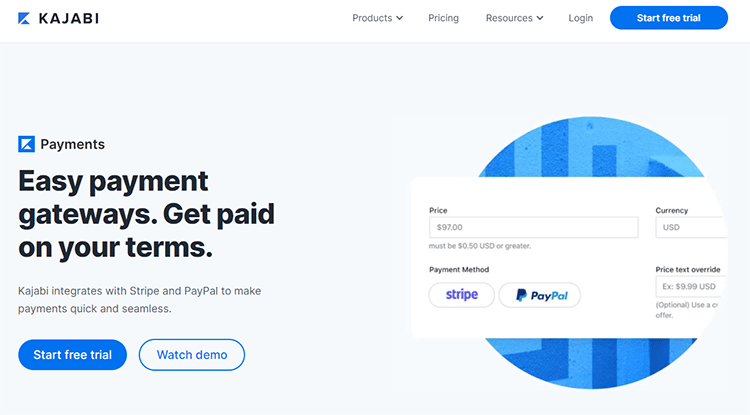
Kajabi handles all necessary security and updates so you don’t have to worry about it. Everything from member data, payment information, and compliance will be taken care of on the platform.
Your video course content is also secure through Wistia. All videos are encrypted to prevent fraud, making this a better option than hosting on websites like YouTube and Vimeo.
This platform is serious about protecting your business data and customer information, which is why they partnered with Cloudflare, a company that specializes in website performance and security for full encryption of your data.
Winner: Kajabi
Both platforms have superb security features, but Kajabi wins this one because the platform has a higher number of security measures designed to protect data and payments online.
Final Thoughts
Kartra vs. Kajabi – which platform is the better choice?
Both these platforms offer great value for money but one will serve you better than the other depending on your needs.
For example, if you already have an LMS service that you are using, then you can choose a platform that is more focused on helping you market and sell more courses.
However, if you want a robust learning management system, then you may be willing to sacrifice advanced email automation to get better course creation and customization features instead.
To help you determine which course creation tool is best for you, here’s a quick summary of what we discussed:
Choose Kartra if:
You are budget-constrained or just starting out and want unique marketing features, such as advanced OTOs (for upsells, downsells, and order bumps) and behavioral adaptive marketing.
Kartra comes at an affordable price of just $99/month and excels over Kajabi in quite a few other areas.
For example, the platform has done-for-you campaigns that let you replicate entire marketing campaigns to your account so you can save time and effort.
You can also share your campaigns and sales funnels with other Kartra users using the platform’s handy “share” feature. Even video hosting on the platform is marketing-oriented, giving you the ability to add pre-and-post videos, as well as CTAs to get your students to take some desired action.
Choose Kajabi if:
You want a more premium platform that comes with robust automation features and community aspects.
At a price of $149/month, this platform isn’t as ideal for beginners, but it has a ton of advanced features at the lower tier plans which makes it more appealing for some than Kartra.
For instance, instead of offering a Facebook group, you’ll be able to create a community around your course which will make you look a lot more professional. Kajabi also has comment sections under each lecture, providing you with the perfect opportunity to engage with students, answer questions, and get feedback on your content.
The platform offers a wide range of assessment features for courses, such as quizzes and surveys, and you can use automation features at a lecture level to trigger emails or notifications to students at specific moments during the course.
Best of all, Kajabi comes with a blogging platform. As a course creator, you know the value of content and you’ll be able to pick from many optimized, expertly-crafted blogging page templates to bring targeted SEO traffic to your course.
